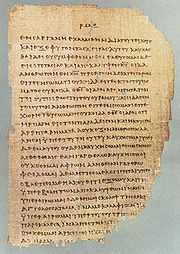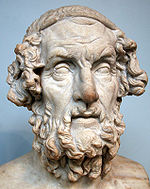- Chalkidiki Greek
-
History of the
Greek language
(see also: Greek alphabet)
Proto-Greek (c. 3000–1600 BC) Mycenaean (c. 1600–1100 BC) Ancient Greek (c. 800–330 BC)
Dialects:
Aeolic, Arcadocypriot, Attic-Ionic,
Doric, Locrian, Pamphylian,
Homeric Greek,
Macedonian (?)Koine Greek (c. 330 BC–330) Medieval Greek (330–1453) Modern Greek (from 1453)
Dialects:
Calabrian, Cappadocian, Cheimarriotika, Cretan,
Cypriot, Demotic, Griko, Katharevousa,
Pontic, Tsakonian, Maniot, Yevanic
*Dates (beginning with Ancient Greek) from Wallace, D. B. (1996). Greek Grammar Beyond the Basics: An Exegetical Syntax of the New Testament. Grand Rapids: Zondervan. p. 12. ISBN 0310218950.The Dialect of Chalkidiki, (Chalkidiki Greek), is a dialect of the Greek language spoken in Chalkidiki (Khalkidiki, Halkidiki, Greek Χαλκιδική).
Regarding the words, as in any other language, the old dialect (frοm the Greek "διάλεκτος" [diˈalektos]) of Northern Greece and especially of Chalkidiki Prefecture, Greece, is divided into three parts:1. The extra Greek words used in the dialect
2. The extra words of foreign origin
3. The pronunciation of the words, and the intonationWhat prevails, however, and is heard is the pronunciation of the words is the “Vowel Reduction”.
The Greek language, as other languages of Mediterranean countries, has five basic sounds of vowels, five cardinal vowels:
[i], monophthongs or diphthongs ι, η, υ, οι, ει
[e], monophthong or diphthong ε, αι
[a], monophthong α
[o], monophthongs ο, ω
[u], diphthong ουIt is well known in linguistics (pronunciation, phonetics), that some vowels are created in the upper part of the cavity of the mouth (high vowels) (in front [i], in the back [u]), others in the middle of the mouth (mid vowels) (in front [e], in the back [o]), and others in the nether part of the mouth (low vowels) ([a]).
As a rule the sounds of vowels that are to be articulated in the middle or upper part, when they are not accented (stressed), they are reduced, i.e. they tend to be created in the upper or uppermost part. As a result the sound [e] is reduced to [i], the sound [o] is reduced [u], and the sounds [u] and [i], in syllables (preceded by consonants), are reduced very much ([i] becomes [j], or even not sounded at all (lost) (not lost when with other vowels). One can find this also in other regions of the Greek mainlandExamples of Pronunciation:
Αύριο θα πάμε Θεσσαλονίκη, becomes: Αύριου θα πάμι Θισαλουνίκj [΄avriu θa ΄pami θisalu΄nikj]
Έχει δουλειές στον Αη-Μάμα και στον Πολύγυρο, becomes: [Εχj δλειές στουν Αj Μάμα κι στουν Πουλύγjρου]. [stu bu΄liɣjru]Some Words and Phrases:
- Τι βολj; [ti volj], How are you?
- Τι φκjανjs; [ˈti ˌfkjɑnjs]. How are you doing? What are you doing
- Τι ρε φκjανjs; [ˈti re ˌfkjɑnjs]. How are you doing? What are you doing (when addressed to a man)
- Τι μαρί φκjανjs; [ˈti maˌri ˌfkjɑnjs]. How are you doing? What are you doing (when addressed to a woman)
- Δε νουγάει [ˈðe nuˌɣɑj], He does not understand/know
- Δεν ουρτονj [ˈðen urˌtonj], He does know anything
- Άφκη τουν [ˈɑfkji tun], Leave him, let him (go)
- Αει σαπέρα [ˈɑj sɑˈperɑ], Go away!
- Παjένου [pɑˈjenu], I am leaving, I am going
- Πλαλώ [plɑˈlo], I run, I am running
- Λαλώ [lɑˈlo], I speak loudly
- Πυρώνουμι [piˈronumi], I warm myself (by a fire, fireplace)
- Κραίνου [ˈkrenu], I speak loudly
- Ταχjά [tɑˈχjɑ], Tomorrow
- Του πάjνι [tu ˈpajni], He/she used to saySee: Varieties of Modern Greek
Greek language · Eλληνική γλώσσα History Proto-Greek (c. 3000–1600 BC) · Mycenaean (c. 1600–1000 BC) · Ancient Greek (c. 1000–330 BC) · Koine Greek (c. 330 BC–330) · Medieval Greek (330–1453) · Modern Greek (from 1453)
Alphabet Letters Phonology Grammar Dialects Cappadocian · Cretan · Cypriot · Chalkidiki · Demotic · Greek-Calabrian · Griko · Katharevousa · Macedonian · Misthiotica · Pontic · Tsakonian · YevanicLiterature Related Topics Promotion and Study Ages of Greek c. 3rd millenium BC c. 1600–1100 BC c. 800–300 BC c. 300 BC – AD 330 c. 330–1453 since 1453 Categories:
Wikimedia Foundation. 2010.
